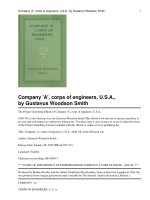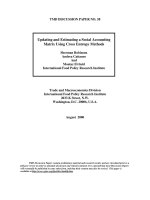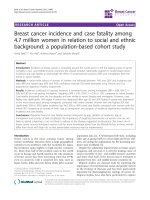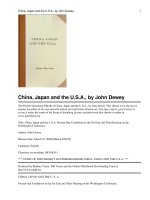Alstom to Plead Guilty and Pay U.S. a 772 Million Fine in a Bribery Scheme
Bạn đang xem bản rút gọn của tài liệu. Xem và tải ngay bản đầy đủ của tài liệu tại đây (162.07 KB, 8 trang )
Alstom to Plead Guilty and Pay U.S. a $772 Million Fine in a Bribery Scheme
NYT By DANIELLE IVORYDEC. 22, 2014
The French industrial giant Alstom has agreed to plead guilty and pay a $772 million
penalty to the United States in a bribery investigation by the Justice Department.
Alstom, an energy and transportation company, had been under investigation in a plot
involving tens of millions of dollars in bribes paid to government officials in Indonesia and
other countries to win power contracts. The criminal penalty, announced Monday, was the
largest ever levied by the United States for foreign bribery.
“Alstom’s corruption scheme was sustained over more than a decade and across several
continents,” said James Cole, deputy attorney general. “It was astounding in its breadth,
its brazenness and its worldwide consequences.”
The Justice Department said Alstom paid more than $75 million in bribes from 2000 to
2011 to secure $4 billion in contracts around the world, which led to profits of about $300
million. Alstom admitted that its executives and other employees had paid bribes to
government officials and falsified records in connection with power contracts in countries
including Egypt, Indonesia and Taiwan.
“There were a number of problems in the past,” said Patrick Kron, Alstom's chief executive, “and we deeply
regret that.” CreditStephane Mahe/Reuters
“There were a number of problems in the past, and we deeply regret that,” Patrick Kron,
Alstom’s chief executive, said in a statement on Monday. “However, this resolution with the
D.O.J. allows Alstom to put this issue behind us and to continue our efforts to ensure that
business is conducted in a responsible way, consistent with the highest ethical standards.”
The Justice Department said that as part of the scheme, for instance, in Indonesia, the
company had bribed a high-ranking member of the Parliament and top officials at the
state-owned electricity company Perusahaan Listrik Negara. The member of the
Indonesian Parliament was convicted in Indonesia of accepting Alstom bribes and is
serving a three-year prison sentence.
Alstom tried to hide its bribery scheme by using consultants to serve as conduits for
payments to officials. Alstom gave some of these individuals code names, like “Mr.
Geneva,” “Quiet Man” and “Old Friend,” according to internal company documents cited by
the Justice Department.
When some officials expressed concern that one consultant had provided only pocket
money, Alstom retained a second consultant to ensure that the officials were satisfied,
recounted Leslie Caldwell, assistant attorney general. In Saudi Arabia, Alstom retained at
least six pseudo-consultants, including two close family members of high-ranking
government officials, to bribe officials at a state-owned electricity company to secure about
$3 billion in contracts.
At one point, a member of Alstom’s finance department sent an email that questioned an
invoice for “consultant services” tied to a contract in Egypt. She was informed that her
inquiry could have “several people put in jail” and was told to delete all previous emails
regarding the consultant, Ms. Caldwell said.
Under the agreement with the federal government, Alstom pleaded guilty to violating the
Foreign Corrupt Practices Act by falsifying its books and records and failing to put
adequate internal controls into effect. A Swiss unit pleaded guilty to conspiring to violate
the anti-bribery provisions of the act.
Continue reading the main storyContinue reading the main story
Continue reading the main story
Its American subsidiaries, Alstom Power and Alstom Grid, entered into deferred
prosecution agreements, admitting that they had conspired to violate the act. A significant
part of the bribery plot was carried out in Windsor, Conn., where Alstom Power has
headquarters, the Justice Department said.
The Justice Department has announced charges against five individuals in connection
with the bribery scheme, including four corporate executives of Alstom. The agency said
the company had refused for several years to cooperate with its investigation. However,
after the department publicly charged several Alstom executives, the company began
providing more thorough assistance.
Mr. Cole added that the Justice Department’s action would send a message that it would
be “relentless in rooting out and punishing corruption to the fullest extent of the law, no
matter how sweeping its scale or how daunting its prosecution.”
The case was investigated by the F.B.I.’s Washington field office. The bureau said it was
creating new squads in New York, Washington and Los Angeles to investigate
international corruption.
In further legal woes for the French conglomerate, a British subsidiary, Alstom Power Ltd.,
was charged on Monday with bribing officials linked to a Lithuanian energy project over an
eight-year period, according to the Serious Fraud Office of Britain.
Two former Alstom employees, Nicholas Reynolds and John Venskus, have also been
charged with conspiring to bribe an official and offering a bribe, according to court
documents.
This year, British authorities also brought charges against Alstom Network UK, another
unit, over corruption accusations linked to transport projects in Poland, Tunisia and India.
In June, Alstom agreed to sell most of its energy business to General Electric. The French
company said it would not be able to transfer its fine over bribery allegations to G.E.
FOR IMMEDIATE RELEASE
Monday, December 22, 2014
Alstom Pleads Guilty and Agrees to Pay $772 Million Criminal Penalty to Resolve Foreign Bribery
Charges
Alstom S.A. (Alstom), a French power and transportation company, pleaded guilty today and agreed to pay a
$772,290,000 fine to resolve charges related to a widespread scheme involving tens of millions of dollars in
bribes in countries around the world, including Indonesia, Saudi Arabia, Egypt and the Bahamas.
Deputy Attorney General James M. Cole, Assistant Attorney General Leslie R. Caldwell of the Justice
Department’s Criminal Division, First Assistant U.S. Attorney Michael J. Gustafson of the District of Connecticut
and FBI Executive Assistant Director Robert Anderson Jr. made the announcement.
“Alstom’s corruption scheme was sustained over more than a decade and across several continents,” said
Deputy Attorney General Cole. “It was astounding in its breadth, its brazenness and its worldwide
consequences. And it is both my expectation – and my intention – that the comprehensive resolution we are
announcing today will send an unmistakable message to other companies around the world: that this Department
of Justice will be relentless in rooting out and punishing corruption to the fullest extent of the law, no matter how
sweeping its scale or how daunting its prosecution.”
“This case is emblematic of how the Department of Justice will investigate and prosecute FCPA cases – and
other corporate crimes,” said Assistant Attorney General Caldwell. “We encourage companies to maintain robust
compliance programs, to voluntarily disclose and eradicate misconduct when it is detected, and to cooperate in
the government’s investigation. But we will not wait for companies to act responsibly. With cooperation or
without it, the department will identify criminal activity at corporations and investigate the conduct ourselves,
using all of our resources, employing every law enforcement tool, and considering all possible actions, including
charges against both corporations and individuals.”
“Today’s historic resolution is an important reminder that our moral and legal mandate to stamp out corruption
does not stop at any border, whether city, state or national,” said First Assistant U.S. Attorney Gustafson. “A
significant part of this illicit work was unfortunately carried out from Alstom Power’s offices in Windsor,
Connecticut. I am hopeful that this resolution, and in particular the deferred prosecution agreement with Alstom
Power, will provide the company an opportunity to reshape its culture and restore its place as a respected
corporate citizen.”
“This investigation spanned years and crossed continents, as agents from the FBI Washington and New Haven
field offices conducted interviews and collected evidence in every corner of the globe,” said FBI Executive
Assistant Director Anderson. “The record dollar amount of the fine is a clear deterrent to companies who would
engage in foreign bribery, but an even better deterrent is that we are sending executives who commit these
crimes to prison.”
Alstom pleaded guilty to a two-count criminal information filed today in the U.S. District Court for the District of
Connecticut, charging the company with violating the Foreign Corrupt Practices Act (FCPA) by falsifying its books
and records and failing to implement adequate internal controls. Alstom admitted its criminal conduct and agreed
to pay a criminal penalty of $772,290,000. U.S. District Judge Janet B. Arterton of the District of Connecticut
scheduled a sentencing hearing for June 23, 2015 at 3pm.
In addition, Alstom Network Schweiz AG, formerly Alstom Prom (Alstom Prom), Alstom’s Swiss subsidiary,
pleaded guilty to a criminal information charging the company with conspiracy to violate the anti-bribery
provisions of the FCPA. Alstom Power Inc. (Alstom Power) and Alstom Grid Inc. (Alstom Grid), two U.S.
subsidiaries, both entered into deferred prosecution agreements, admitting that they conspired to violate the antibribery provisions of the FCPA. Alstom Power is headquartered in Windsor, Connecticut, and Alstom Grid,
formerly Alstom T&D, was headquartered in New Jersey.
According to the companies’ admissions, Alstom, Alstom Prom, Alstom Power and Alstom Grid, through various
executives and employees, paid bribes to government officials and falsified books and records in connection with
power, grid and transportation projects for state-owned entities around the world, including in Indonesia, Egypt,
Saudi Arabia, the Bahamas and Taiwan. In Indonesia, for example, Alstom, Alstom Prom, and Alstom Power
paid bribes to government officials – including a high-ranking member of the Indonesian Parliament and highranking members of Perusahaan Listrik Negara, the state-owned electricity company in Indonesia – in exchange
for assistance in securing several contracts to provide power-related services valued at approximately $375
million. In total, Alstom paid more than $75 million to secure $4 billion in projects around the world, with a profit
to the company of approximately $300 million.
Alstom and its subsidiaries also attempted to conceal the bribery scheme by retaining consultants purportedly to
provide consulting services on behalf of the companies, but who actually served as conduits for corrupt
payments to the government officials. Internal Alstom documents refer to some of the consultants in code,
including “Mr. Geneva,” “Mr. Paris,” “London,” “Quiet Man” and “Old Friend.”
The plea agreement cites many factors considered by the department in reaching the appropriate resolution,
including: Alstom’s failure to voluntarily disclose the misconduct even though it was aware of related misconduct
at a U.S. subsidiary that previously resolved corruption charges with the department in connection with a power
project in Italy; Alstom’s refusal to fully cooperate with the department’s investigation for several years; the
breadth of the companies’ misconduct, which spanned many years, occurred in countries around the globe and
in several business lines, and involved sophisticated schemes to bribe high-level government officials; Alstom’s
lack of an effective compliance and ethics program at the time of the conduct; and Alstom’s prior criminal
misconduct, including conduct that led to resolutions with various other governments and the World Bank.
After the department publicly charged several Alstom executives, however, Alstom began providing thorough
cooperation, including assisting the department’s prosecution of other companies and individuals.
To date, the department has announced charges against five individuals, including four corporate executives of
Alstom and its subsidiaries, for alleged corrupt conduct involving Alstom. Frederic Pierucci, Alstom’s former vice
president of global boiler sales, pleaded guilty on July 29, 2013, to conspiring to violate the FCPA and a charge
of violating the FCPA for his role in the Indonesia bribery scheme. David Rothschild, Alstom Power’s former vice
president of regional sales, pleaded guilty on Nov. 2, 2012, to conspiracy to violate the FCPA. William Pomponi,
Alstom Power’s former vice president of regional sales, pleaded guilty on July 17, 2014, to conspiracy to violate
the FCPA. Lawrence Hoskins, Alstom’s former senior vice president for the Asia region, was charged in a
second superseding indictment on July 30, 2013, and is pending trial in the District of Connecticut in June 2015.
The charges against Hoskins are merely allegations, and he is presumed innocent unless and until proven guilty.
The high-ranking member of Indonesian Parliament was also convicted in Indonesia of accepting bribes from
Alstom, and is currently serving a three-year term of imprisonment.
In connection with a corrupt scheme in Egypt, Asem Elgawhary, the general manager of an entity working on
behalf of the Egyptian Electricity Holding Company, a state-owned electricity company, pleaded guilty on Dec. 4,
2014, in federal court in the District of Maryland to mail fraud, conspiring to launder money, and tax fraud for
accepting kickbacks from Alstom and other companies. In his plea agreement, Elgawhary agreed to serve 42
months in prison and forfeit approximately $5.2 million in proceeds.
This case is being investigated by the FBI’s Washington Field Office, with assistance from the FBI’s Meriden,
Connecticut Resident Agency, and the FBI’s Newark and Baltimore Divisions. The department appreciates the
significant cooperation provided by its law enforcement colleagues in Indonesia at the Komisi Pemberantasan
Korupsi (Corruption Eradication Commission), the Office of the Attorney General in Switzerland, the Serious
Fraud Office in the United Kingdom, as well as authorities in Germany, Italy, Singapore, Saudi Arabia, Cyprus
and Taiwan.
The case is being prosecuted by Assistant Chief Daniel S. Kahn of the Criminal Division’s Fraud Section and
Assistant U.S. Attorney David E. Novick of the District of Connecticut, together with Assistant U.S. Attorney Zach
Intrater of the District of New Jersey on the investigation of Alstom Grid and Assistant U.S. Attorney David I.
Salem of the District of Maryland on the investigation of Asem Elgawhary. The Criminal Division’s Office of
International Affairs also provided substantial assistance.
Additional information about the Justice Department’s FCPA enforcement efforts can be found
atwww.justice.gov/criminal/fraud/fcpa.
Dutch Insurer Fined $27.9 Million and Ordered to Dismiss C.F.O.
By CHAD BRAY
NYT DECEMBER 22, 2014
LONDON — The Dutch insurer Delta Lloyd said on Monday that the central bank of the Netherlands had fined it
22.8 million euros, or about $27.9 million, and ordered it to dismiss its chief financial officer by 2016 because of
improper gains from interest-rate hedging.
The insurer said that it planned to challenge the decision by the central bank, De Nederlandsche Bank, in court
and that the remedial measures were “disproportionate” and “based on incorrect assumptions.”
The central bank’s findings relate to a fixed interest rate introduced in July 2012 to calculate insurance liabilities
with terms exceeding 20 years, the insurer said. In the week before the fixed interest rate was introduced, Delta
Lloyd reduced its hedges of interest-rate risk, prompting an investigation.
Delta Lloyd also conducted its own internal review of its hedging decisions.
“We cannot reconcile D.N.B.’s view with the facts as established by us,” Jean Frijns, the chairman of Delta
Lloyd’s supervisory board, said in a news release. “We have no doubt that Delta Lloyd acted at all times in the
interests of all stakeholders. That is why we have chosen to take these legal steps, because it is the only way to
obtain an independent ruling on this difference of opinion.”
The central bank did not immediately respond to a request for comment on Monday.
In its investigation, the central bank concluded that the insurer’s hedging decisions were conducted without due
care, that Delta Lloyd should not have reduced its hedges at the time and that the insurer’s actions were
inconsistent with its own risk policy, the insurer said.
The central bank contends that Delta Lloyd had improperly gained €21.6 million by using confidential information,
the insurer said.
The central bank also said on Monday that Emiel Roozen, the chief financial officer of Delta Lloyd, should be
dismissed by Jan. 1, 2016.
Delta Lloyd was spun off from the British insurer Aviva in an initial public offering in 2009. The Dutch insurer
wrote €4.7 billion in premiums in 2013 and employs about 5,100 people.
FCA bans £43,000 fare dodger from working in financial services
Financial Conduct Authority says conduct of former Blackrock MD Jonathan Paul Burrows fell short of the
standards expected in the City
Jonathan Paul Burrows has been barred by the Financial Conduct Authority from taking any job in the regulated
financial services industry. Photograph: Jamie Wiseman / Daily Mail/Solo Syndication
Guardian Jennifer Rankin Tuesday 16 December 2014
A former City executive has been banned for life from any senior role in the financial services industry, after
being exposed as one of the UK’s biggest train fare dodgers.
Jonathan Paul Burrows, a former managing director at Blackrock Asset Management, has been barred by
the Financial Conduct Authority from taking any responsible role in the financial services industry.
Announcing the ban, the FCA’s director of enforcement and financial crime, Tracey McDermott, said: “Burrows
held a senior position within the financial services industry. His conduct fell short of the standards we expect.
Approved persons must act with honesty and integrity at all times and, where they do not, we will take action.”
His dishonest behaviour came to the attention of the City watchdog after it came to light that he had saved
himself almost £43,000 over several years by exploiting a loophole at the ticket barriers.
The East Sussex commuter boarded the London-bound train at Stonegate, a rural station with no ticket barriers.
When he arrived at Cannon Street station in London, he tapped in using an Oyster card, paying a £7.20 fare,
rather than the £21.50 cost of his journey.
Burrows avoided prosecution after making an out-of-court-settlement with Southeastern railways, but had to
resign from his high-flying job at Blackrock after a public outcry.
He told the FCA he knew he was breaking the law and had not disclosed his behaviour to his employer. The FCA
said they had taken these facts into account when deciding what action to take.
Today’s ruling ends Burrows’s lucrative City career. At Blackrock he had reportedly earned £1m a year. He will
never again be allowed into a position of authority, although, in theory, he could take junior back-office jobs.
In a statement after the FCA ruling, Burrows said: “I have always recognised that what I did was foolish. I have
apologised to all concerned and reiterate that apology publicly today.”
“While I respect the FCA’s decision today, I also regret it, coming as it did after a 20-year career in the City that
was without blemish. I recognise that the FCA has on its plate more profound wrongdoing than mine in the
financial services sector, and I am sorry that my case has taken up its time at this critical juncture for the future of
the City and its reputation.”
Last year the FCA banned 43 people from working in senior financial services jobs for failing the “fit and proper”
test, but few attracted as much attention as Burrows. The fund manager initially managed to keep his identity
secret through an out-of-court settlement that roused the anger of unions. At the time, Manuel Cortes, the leader
of the TSSA transport union, said the anonymous agreement showed there was one law for the rich and one for
the poor. Burrows’s identitywas first revealed by the Daily Mail, who contrasted his “two huge, mortgage-free
mansions in the East Sussex countryside” with the £4,500 cost of the season ticket.
The majority of people subject to an FCA ban have committed offences at work and Burrows is only the second
person to be banned by for wrongdoing unrelated to his job. His case follows senior money-market manager
Anthony Verrier, who earlier this year accepted an FCA ban , after being censured by a high court judge for
dishonesty.
Many commuters voiced anger that Burrows avoided prosecution, but othersexpressed a sneaking
admiration that he managed to get away with it for so long.
The £43,000 that Burrows repaid to Southeastern trains was calculated on the basis of single fares. This meant
the settlement cost him £20,000 more than if he had bought season tickets.









